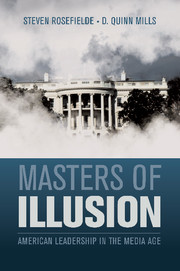Book contents
- Frontmatter
- Contents
- List of Tables and Figures
- Preface
- Acronyms
- Executive Summary
- Acknowledgments
- PART I NATIONAL SECURITY IN THE NEW AGE
- PART II AMERICAN PUBLIC CULTURE AND THE WORLD
- PART III AMERICAN PUBLIC CULTURE AND OURSELVES
- PART IV THE RECONFIGURATION OF NATIONAL WEALTH AND POWER
- PART V VORTEXES OF DANGER
- PART VI THE AMERICAN RESPONSE
- PART VII LEADING TOWARD PEACE
- 15 The Dangers of Overreach
- 16 The Transatlantic Trap
- 17 The Middle Course
- PART VIII AMERICAN PRESIDENTIAL LEADERSHIP
- Notes
- Glossary
- Bibliography
- Index
16 - The Transatlantic Trap
Published online by Cambridge University Press: 31 July 2009
- Frontmatter
- Contents
- List of Tables and Figures
- Preface
- Acronyms
- Executive Summary
- Acknowledgments
- PART I NATIONAL SECURITY IN THE NEW AGE
- PART II AMERICAN PUBLIC CULTURE AND THE WORLD
- PART III AMERICAN PUBLIC CULTURE AND OURSELVES
- PART IV THE RECONFIGURATION OF NATIONAL WEALTH AND POWER
- PART V VORTEXES OF DANGER
- PART VI THE AMERICAN RESPONSE
- PART VII LEADING TOWARD PEACE
- 15 The Dangers of Overreach
- 16 The Transatlantic Trap
- 17 The Middle Course
- PART VIII AMERICAN PRESIDENTIAL LEADERSHIP
- Notes
- Glossary
- Bibliography
- Index
Summary
America has had new responsibilities thrust on it in the world and is trying to determine how best to cope with them. Europe sponsors a vision of world peace brought about by cooperation among nations to remove deprivation and oppression from the world. The notion is that the West can sponsor its values to the rest of the world – via the United Nations, international law, and international courts of justice – and they will be adopted, and that peace and prosperity will follow.
On the surface, this idealistic multilateralism seems desirable. It asserts that we should consult with our friends abroad, particularly our European allies, in determining what to do, and then act jointly with them. If we consult, and don't agree, then presumably we should consult some more until agreement is reached. If we act without the support of other nations, and over their objections, and they criticize us, then it appears that we've been arrogant and have lost the confidence and support of our allies, and that this is reprehensible.
The problem with multilateralism, however, is that it is so easily abused. Other countries often do not share our interests or concerns. When we are attacked, they express public sympathy but attempt to use the situation for their own purposes. Recognizing American economic and military power, those who would restrain the application of American power, or who oppose American initiatives, seek to force the United States into multinational forums where we are most ineffective and therefore weakest.
- Type
- Chapter
- Information
- Masters of IllusionAmerican Leadership in the Media Age, pp. 359 - 383Publisher: Cambridge University PressPrint publication year: 2006



